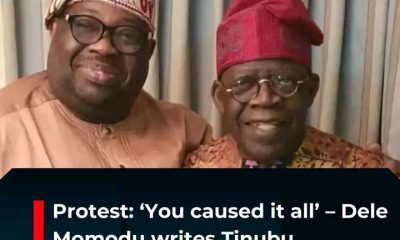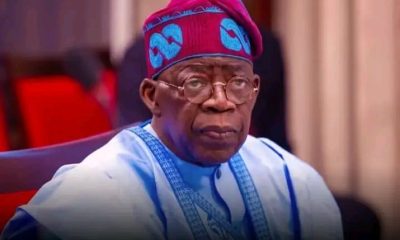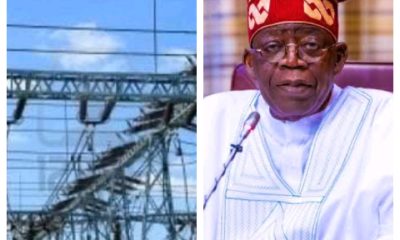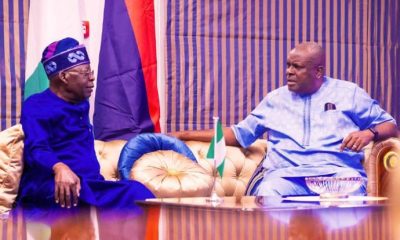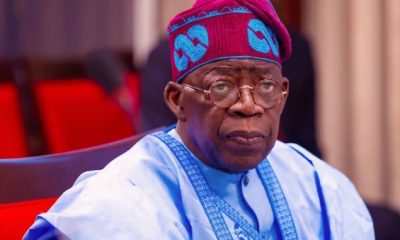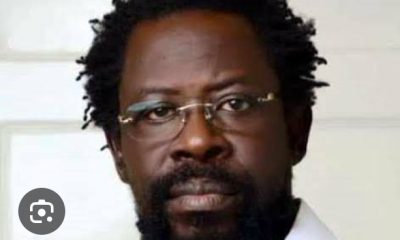Breaking
AFTER DARKNESS COMES THE GLORIOUS DAWN.
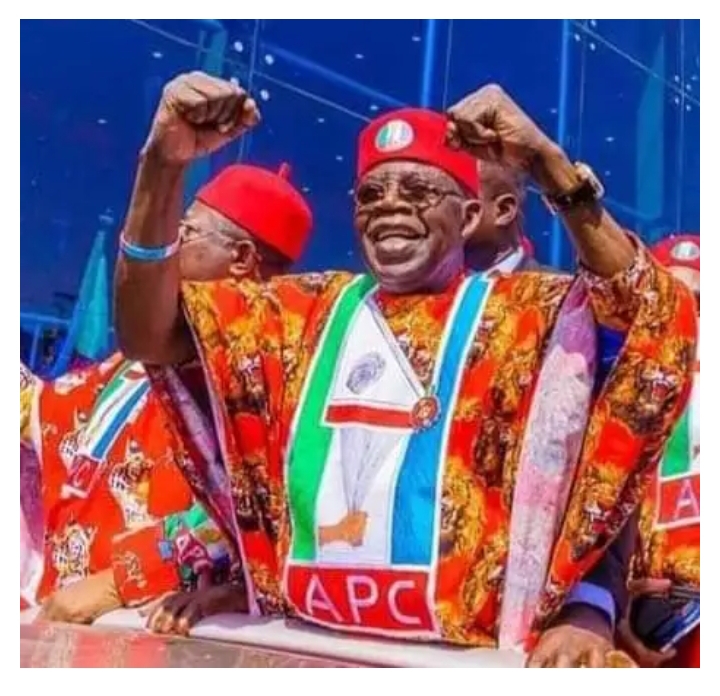
FULL TEXT OF THE NATIONAL BROADCAST BY PRESIDENT BOLA TINUBU TO NIGERIANS ON CURRENT ECONOMIC CHALLENGES.
My fellow citizens,
1. I want to talk to you about our economy. It is important that you understand the reasons for the policy measures I have taken to combat the serious economic challenges this nation has long faced.
2. I am not going to talk in difficult terms by dwelling on economic jargon and concepts. I will speak in plain, clear language so that you know where I stand. More importantly, so that you see and hopefully will share my vision regarding the journey to a better, more productive economy for our beloved country
3. For several years, I have consistently maintained the position that the fuel subsidy had to go. This once beneficial measure had outlived its usefulness. The subsidy cost us trillions of Naira yearly. Such a vast sum of money would have been better spent on public transportation, healthcare, schools, housing, and even national security. Instead, it was being funnelled into the deep pockets and lavish bank accounts of a select group of individuals.
4. This group had amassed so much wealth and power that they became a serious threat to the fairness of our economy and the integrity of our democratic governance. To be blunt, Nigeria could never become the society it was intended to be as long as such small, powerful yet unelected groups hold enormous influence over our political economy and the institutions that govern it.
5. The whims of the few should never hold dominant sway over the hopes and aspirations of the many. If we are to be a democracy, the people and not the power of money must be sovereign.
6. The preceding administration saw this looming danger as well. Indeed, it made no provision in the 2023 Appropriations for subsidy after June this year. Removal of this once helpful device that had transformed into a millstone around the country’s neck had become inevitable.
7. Also, the multiple exchange rate system that had been established became nothing but a highway of currency speculation. It diverted money that should have been used to create jobs, build factories and businesses for millions of people. Our national wealth was doled on favorable terms to a handful of people who have been made filthy rich simply by moving money from one hand to another. This too was extremely unfair.
8. It also compounded the threat that the illicit and mass accumulation of money posed to the future of our democratic system and its economy.
9. I had promised to reform the economy for the long-term good by fighting the major imbalances that had plagued our economy. Ending the subsidy and the preferential exchange rate system was key to this fight. This fight is to define the fate and future of our nation. Much is in the balance.
10. Thus, the defects in our economy immensely profited a tiny elite, the elite of the elite you might call them. As we moved to fight the flaws in the economy, the people who grow rich from them, predictably, will fight back through every means necessary.
29. In the same vein, we are also working in collaboration with the Labour unions to introduce a new national minimum wage for workers. I want to tell our workers this: your salary review is coming.
30. Once we agree on the new minimum wage and general upward review, we will make budget provisions for it for immediate implementation.
31. I want to use this opportunity to salute many private employers in the Organised Private Sector who have already implemented general salary reviews for employees.
32. Fellow Nigerians, this period may be hard on us and there is no doubt about it that it is tough on us. But I urge you all to look beyond the present temporary pains and aim at the larger picture. All of our good and helpful plans are in the works. More importantly, I know that they will work.
33. Sadly, there was an unavoidable lag between subsidy removal and these plans coming fully online. However, we are swiftly closing the time gap. I plead with you to please have faith in our ability to deliver and in our concern for your well-being.
34. We will get out of this turbulence. And, due to the measures we have taken, Nigeria will be better equipped and able to take advantage of the future that awaits her.
35. In a little over two months, we have saved over a trillion Naira that would have been squandered on the unproductive fuel subsidy which only benefitted smugglers and fraudsters. That money will now be used more directly and more beneficially for you and your families.
36. For example, we shall fulfill our promise to make education more affordable to all and provide loans to higher education students who may need them. No Nigerian student will have to abandon his or her education because of lack of money.
37. Our commitment is to promote the greatest good for the greatest number of our people. On this principle, we shall never falter.
38. We are also monitoring the effects of the exchange rate and inflation on gasoline prices. If and when necessary, we will intervene.
39. I assure you my fellow countrymen and women that we are exiting the darkness to enter a new and glorious dawn.
40. Now, I must get back to work to make this vision come true.
41. Thank you all for listening and may God bless the Federal Republic of Nigeria.
Breaking
International: Iran Confirms Death of Supreme Leader Ayatollah Ali Khamenei After US-Israeli Strikes — 40-Day National Mourning Declared
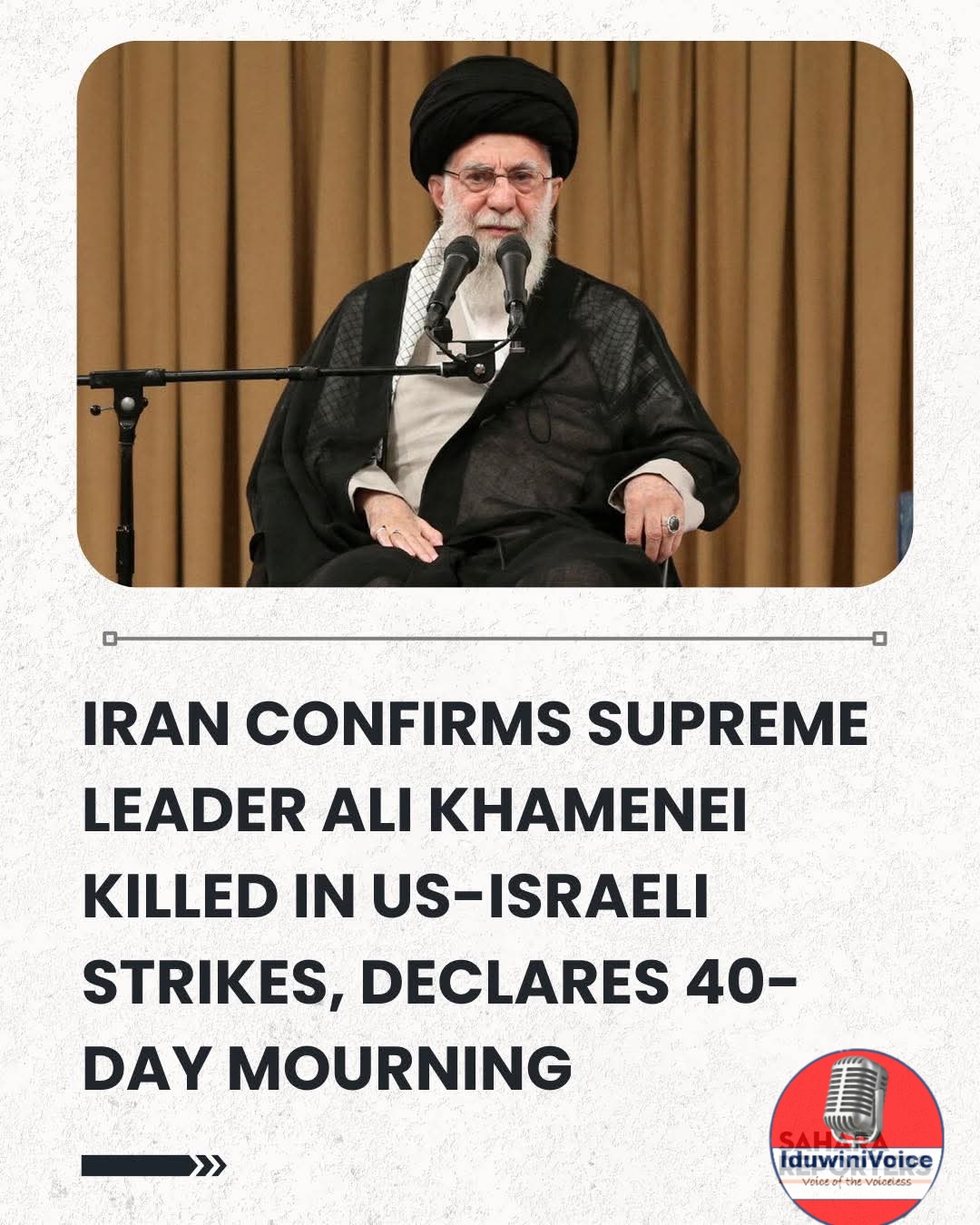
By Favour Bibaikefie, International Affairs Correspondent
Tehran — In an unprecedented escalation of Middle East tensions, Iran’s state media has confirmed that Supreme Leader Ali Khamenei has been killed following coordinated military strikes by the United States and Israel, the government announced late Saturday.
In a statement broadcast on state television, Iranian authorities declared a 40-day period of mourning and seven days of public holiday across the Islamic Republic in memory of the 86-year-old cleric, who had led Iran since 1989.
The announcement confirmed reports from earlier in the day by U.S. and Israeli officials that Khamenei had been killed during a major offensive dubbed “Operation Epic Fury” — a series of air and missile strikes targeting regime leadership and strategic sites across Iran.
President Donald Trump, in a social media post, hailed Khamenei’s death as a significant blow to the Iranian regime, describing him as one of “the most evil people in history.” Israeli Prime Minister Benjamin Netanyahu also said there were strong indications that the cleric was “no longer alive” after his compound in Tehran was hit during the attack.
Iranian state media further reported that several members of Khamenei’s immediate family, including a daughter, son-in-law and a grandchild, were killed in the same strike. Tehran’s Supreme National Security Council labelled the attack an “act of aggression” and vowed to hold the United States and Israel accountable.
The death of Iran’s supreme leader — who wielded ultimate authority over the country’s military, judiciary and all branches of government — has triggered widespread uncertainty about the future leadership of the Islamic Republic and heightened fears of broader regional conflict.
The strikes have already prompted retaliatory actions from Iranian forces, with explosions reported across several Middle East countries. International capitals are watching developments closely as responses from neighbouring states and global powers continue to unfold.
Breaking
Dangote Signs $400m Equipment Deal to Accelerate Refinery Expansion
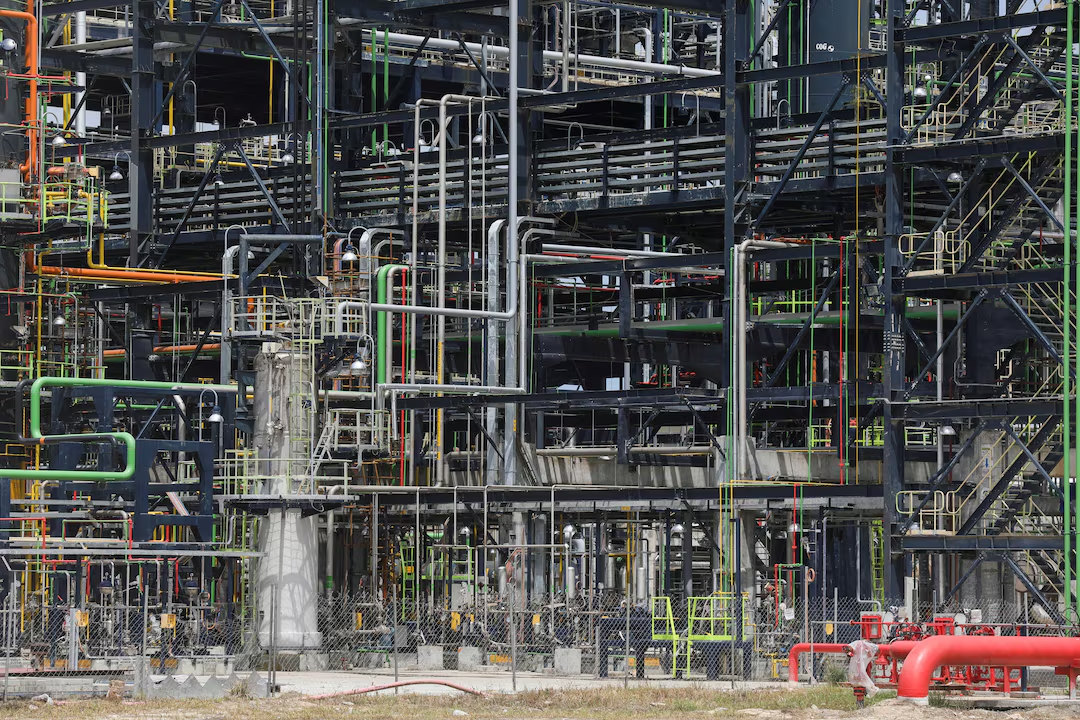
By Favour Bibaikefie
LAGOS — Nigeria’s Dangote Group has signed a $400 million equipment agreement with China’s Xuzhou Construction Machinery Group (XCMG) to accelerate the expansion of its oil refinery, reinforcing efforts to boost domestic refining capacity and industrial development.
The company disclosed on Tuesday that the newly acquired equipment will support ongoing projects across its refining, petrochemical, agricultural, and infrastructure operations. The strategic investment is part of Dangote Group’s broader plan to scale up the refinery’s output toward a projected capacity of 1.4 million barrels per day.
Industry analysts say the expansion represents a significant milestone in Nigeria’s drive to reduce dependence on imported petroleum products while strengthening local production and economic growth.
The Dangote Refinery, regarded as one of Africa’s largest industrial projects, is expected to enhance fuel availability, stimulate job creation, and position Nigeria as a key exporter of refined petroleum products in the global energy market.
Breaking
Agbor Makes List as PDP Appoints Caretaker Committees for Osun, Enugu, Imo, Rivers and Delta States
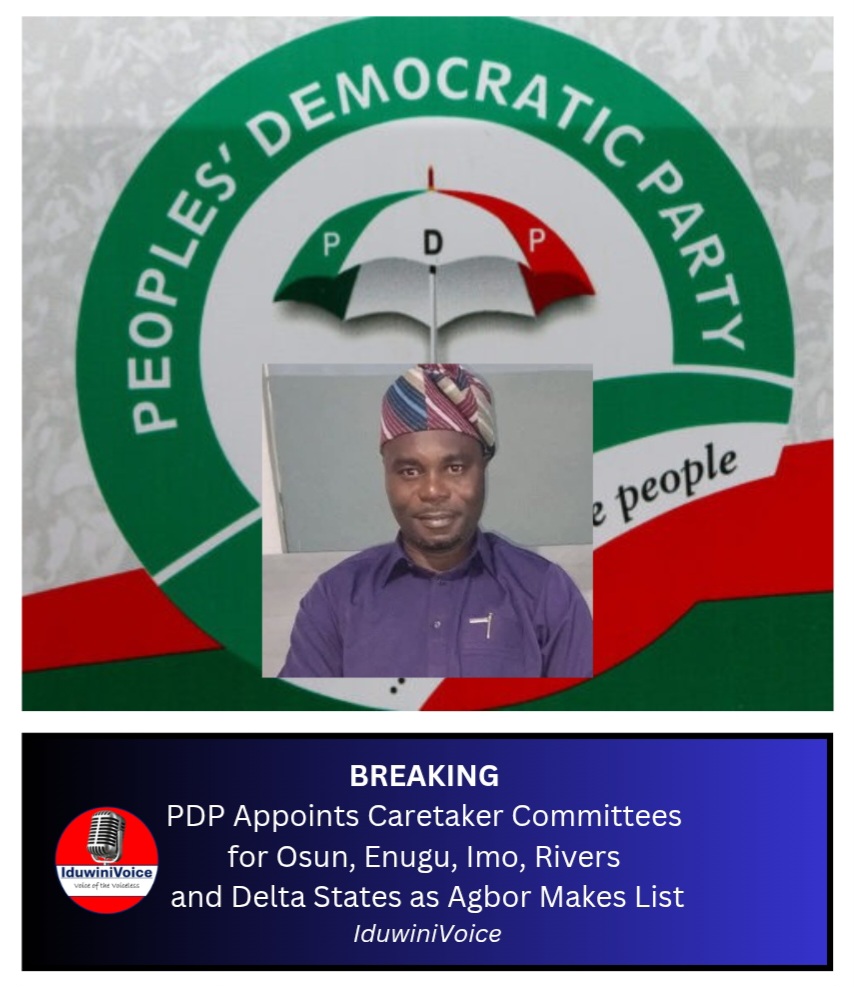
By: Divine Perezide
The National Working Committee (NWC) of the Peoples Democratic Party (PDP) has approved new caretaker committees to oversee the affairs of the party in five states, pending the inauguration of fresh executive structures.
In a public notice dated January 15, 2026, and signed by the National Organising Secretary, Hon. Theophilus Dakas Shan, the NWC said the decision was taken on behalf of the National Executive Committee (NEC) and in line with constitutional provisions. According to the statement, the appointments were made “pursuant to Section 29(2)(b) of our Constitution (2025 as amended).”
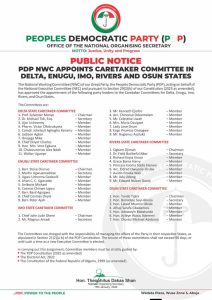
State Committees Announced
For Delta State, the committee is headed by Prof. Sylvester Monye as Chairman, with Dr. Michael Tidi, Esq. serving as Secretary. They will be supported by 16 other members including Ujor Ucheonny, Pharm. Victor Ofobrukuta, Comdr. Johnbull Aghogho Kenairu, Chief Ekiyor Charles, and Hon. Mrs. Vero Egbuna, among others.
In Enugu State, Barr. Steve Oruruo was appointed Chairman, while Martin Ugwuamaideze was named Secretary. The committee includes seven additional members such as Ugwu Uchenna Godswill, Lilian C.E. Ugwuoke, and Chief Cosmas Onyia.
The Imo State Caretaker Committee is comparatively lean, with Chief John Jude Okere as Chairman and Mr. Magnus Amadi as Secretary.
For Rivers State, Ogbam Ojimah was named Chairman, with Dr. Field Baribeful Nkor appointed as Secretary. Other members include Richard Enyia Victor, Grace Boma Harry, Princess Isoma Stella Elenwa, and Austin Emeka Wali.
In Osun State, Hon. Tunde Tijani leads the committee, with Hon. Bamidele Seyi-Abiola serving as Secretary. Five additional members were listed, including Hon. Lateef Mumini Obidel and Alhaji Sarafa Gbadeamosi.
Mandate and Tenure
The PDP clarified that the committees are mandated to “manage the affairs of the Party in their respective States, as stipulated in Section 21(2)(a-b) of the PDP Constitution.” The party further noted that the duration of the committees “shall not exceed 90 days, or until such a time as a new Executive Committee is elected.”
Members were also advised to conduct their activities in compliance with the PDP Constitution (2025 as amended), the Electoral Act 2022, and the Nigerian Constitution (1999 as amended).
Meanwhile, the notice closed with the party’s slogan, “PDP, Power to the People,” indicating continuity of its internal restructuring ahead of future political engagements.

